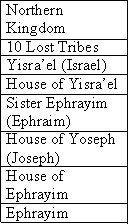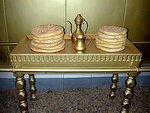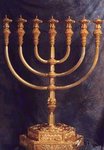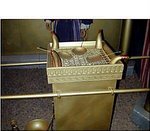As I walked out of the store shaking my head I was sincerely surprised. I assumed that the significance of Passover would likely find it’s way into the Christian stores. I did however find decorative Easter eggs, cute little spring bunnies, and a million crosses. It occurred to me that maybe the Christian church doesn’t really understand all that Passover signifies and represents. I will attempt to give an overview on Passover. But you, as a student of the Scriptures, must take responsibility to look it up for yourself.
Passover is the most popular Jewish holiday. It is the first of the Spring Feasts. Immediately following is the Feast of Unleavened Bread. Those of us who were brought up in church or those who have watched the movie “The Ten Commandments” with Charlton Heston, know well the story of the Hebrews who were in bondage to the Egyptians for several hundred years. Although Cecil B. De Mille made a classic movie it is not entirely accurate but it gives an example of how things went to some extent. If you aren’t familiar with the real story, please read Exodus chapters 3-14.
 Yahweh sends Pharaoh and the Egyptians through a series of plagues each bringing the demand to Pharaoh to “Let My People Go!” Because of his hardness of heart, Pharaoh refuses and the plagues continue. The final plague (10 plagues in all) is the death of the first born. Yahweh instructs His people, through Moses, to take a perfect lamb, and kill it, then dipping hyssop into the blood and placing the blood on the doorposts of their home. In doing this, death will not come for their firstborn. They are saved from death. The mourning of the Egyptians was heard throughout the land that night.
Yahweh sends Pharaoh and the Egyptians through a series of plagues each bringing the demand to Pharaoh to “Let My People Go!” Because of his hardness of heart, Pharaoh refuses and the plagues continue. The final plague (10 plagues in all) is the death of the first born. Yahweh instructs His people, through Moses, to take a perfect lamb, and kill it, then dipping hyssop into the blood and placing the blood on the doorposts of their home. In doing this, death will not come for their firstborn. They are saved from death. The mourning of the Egyptians was heard throughout the land that night.At this Pharaoh finally sends the Hebrews away from him, which brings us to the story of the crossing of the Sea of Reeds. Pharaoh can’t leave well enough alone and admit defeat so he and his army chase the Hebrews and then witness the awesome power of Yahweh by seeing the sea part. The Hebrews walk across on dry ground. Pharaoh and his army are not so fortunate. They are drowned in the sea. So Yul Bryne
 r does not go back to Egypt but dies in the sea. By the way, Yul Bryner’s real grandfather was Jewish and a Christian.
r does not go back to Egypt but dies in the sea. By the way, Yul Bryner’s real grandfather was Jewish and a Christian.The Israelites are saved from death and delivered from Egypt though the miraculous power of Elohim.
Exo. Chapters 12-14 gives His instructions on how the children of Israel were to keep the Feast of Passover and Unleavened Bread and that it was to be a remembrance for all generations, an everlasting law, both for the children of Israel and for the sojourner. See also Lev. 23.
Yahshua kept the Passover as well as the disciples and Paul. See John 2:13-25, John 13:1, Matthew 26:17-28, Mark 14:12-25, Luke 22:7-20, Acts 20:6.
The Christian church, celebrates the death and resurrection of our Savior Yahshua. If you’ve watched Mel Gibson’s movie “The Passion of the Christ”, you will see a horrific execution yet a beautiful message of what Yahshua did for us. We who grew up in church know very well John 3:16 “For Elohim so loved the world that He gave His only brought-forth Son, so that everyone who believes in Him should not perish but possess everlasting life.”
John the Baptist introduced Yahshua by saying “Behold the Lamb of Yahweh, who takes away the sin of the world.” John 1:29. The Jews had been celebrating Passover for years. They understood the significance of John’s statements. Isaiah 53 speaks of what the Messiah would go through as our sacrifice. He would be our Passover Lamb. Isa. 53:5 “But He was pierced
 for our transgressions, He was crushed for our crookedness. The chastisement for our peace was upon Him, and by His stripes we are healed.”
for our transgressions, He was crushed for our crookedness. The chastisement for our peace was upon Him, and by His stripes we are healed.”So in keeping with the name of this newsletter, let’s connect. Taking the story of the Exodus of the Hebrews and the story of Yahshua’s death and resurrection let’s connect the dotted line between the two.
The Passover Festival was observed the exact same way every time. On the tenth of Aviv, before the actual feast day, a lamb was chosen by the high priest outside of Jerusalem . The priest would lead this lamb into the city while crowds of worshippers lined the streets waving palm branches and singing Psalm 118. They would not use the Name of Yahweh because it had become punishable by death. However, this time as Yahshua entered Jerusalem on the colt, the crowds heralded the entrance of the sacrificial lamb, the Lamb of Yahweh! They cried out, “Blessed is He who comes in the Name of Yahweh.” Yahshua comes in the Name of His Father.
The High Priest would then take the lamb to the Temple, where it would be tied in public view so that it could be inspected for blemish. In the same way, Yahshua sat and taught in the Temple courtyard for 4 days. He was inspected and questioned by the Sadducees, the Pharisees, and the teachers of the day, to trip Him up in His words and entrap Him. They could not, because He was perfect and without blemish.
The “Last Supper” was not a Passover meal, however Yahshua explained the upcoming meal and used the elements in the meal to show how He is represented in it. In the Passover meal there are 4 cups of wine, or juice, that are taken. The third cup is called the Cup of Redemption. It was with this cup that Yahshua took and instructed his disciples to take in remembrance of Him. Why? Because He is our Redemption! Leaven represents sin. The bread He broke was unleavened bread, He was without sin. The bread He asked us to remember Him with was a traditional Jewish bread that you can buy today called Matzah bread. It is a cracker that is pierced, bruised, and stripped, as He was for us. Yahshua wasn’t really starting some new “communion,” He asked His disciples to remember Him each time they held the Passover and to remember how the elements represent Him. The next day Yahshua would be sacrificed as the Lamb at the same time the lambs were.
 That evening the Passover Meal would be eaten. It would be at that point that the disciples would see the Cup of Redemption and the Matzah bread and would hopefully make the connection and remember His words.
That evening the Passover Meal would be eaten. It would be at that point that the disciples would see the Cup of Redemption and the Matzah bread and would hopefully make the connection and remember His words.Yahshua died as the lambs for the Passover meal were being slain. Not a bone was to be broken in these sacrificial lambs (Ex 12:46, Num. 9:12) Yahshua, the Lamb of Yahweh, was the perfect sacrifice for the sins of the world (1Cor.5:7)
A sign was hung on each lamb’s neck, bearing the name of the owner of the lamb. Yahshua was crucified with a sign hung over His head. Pilot instructed that a sign was to be hung on the stake stating “Yahshua of Nazareth King of the Jews” in three languages. In Hebrew it would have been written as Yahshua Hanazri Vemelech Hayahudim, YHVH or YHWH is the Tetragrammaton for Yahweh’s Name! The Name of the Father! That is why the priests insisted that Pilot change what was posted. (John 19:21-22). Yahshua not only comes in the Father’s Name but carries His Father’s Name.
Of course we all know the story does not end there. He is not only our Salvation, but our Risen Master and soon coming King.
So should we keep the Passover today? Some would say that it was a law and command to the Hebrews only. Well, I guess that would mean us since we are of Jewish descent. But regardless of that fact, if the disciples, Paul (Shaul), and the early believers continued to keep the feasts long after Yahshua ascended, then why not us? If Yahshua Himself tells us to remember Him each time we observe the Passover Meal and see the represented elements before us, why are we not doing this?
For those who do not consider themselves Jewish, or Hebrew, and therefore feel they do not need to observe the feasts, I would suggest you read Romans 11. There is one tree, not two separate trees. We are all under one marriage contract. I would also suggest reading the commands about keeping the feasts and you will see that it is for the children of Israel as well as for the sojourner, or stranger who is among them. Yahshua was a Hebrew, His parents were Hebrew, He spoke Hebrew. He taught in the Jewish synagogues. The whole of our Scriptures is about a Hebrew people, their history, and the covenant that Yahweh made with them. Why would we throw away everything that is “Jewish”?

So to the gal at the Christian Bookstore, I would suggest she read her Scriptures, get rid of the bunnies and eggs and focus on the Passover Lamb! It’s not a Jewish Holiday, it’s the Feast of Yahweh for all believers! Yahweh describes it as a remembrance for all generations, an everlasting law.
There is so much more that can be written about how Yahshua fulfilled all the prophecies of being the Messiah and on how He bought us with His blood. When you study Passover and all that it represents you will see that it is symbolic of both the story of the deliverance from Egypt and the Plan of our Salvation.
Excerpts taken from “A Family Guide to the Biblical Holidays”














